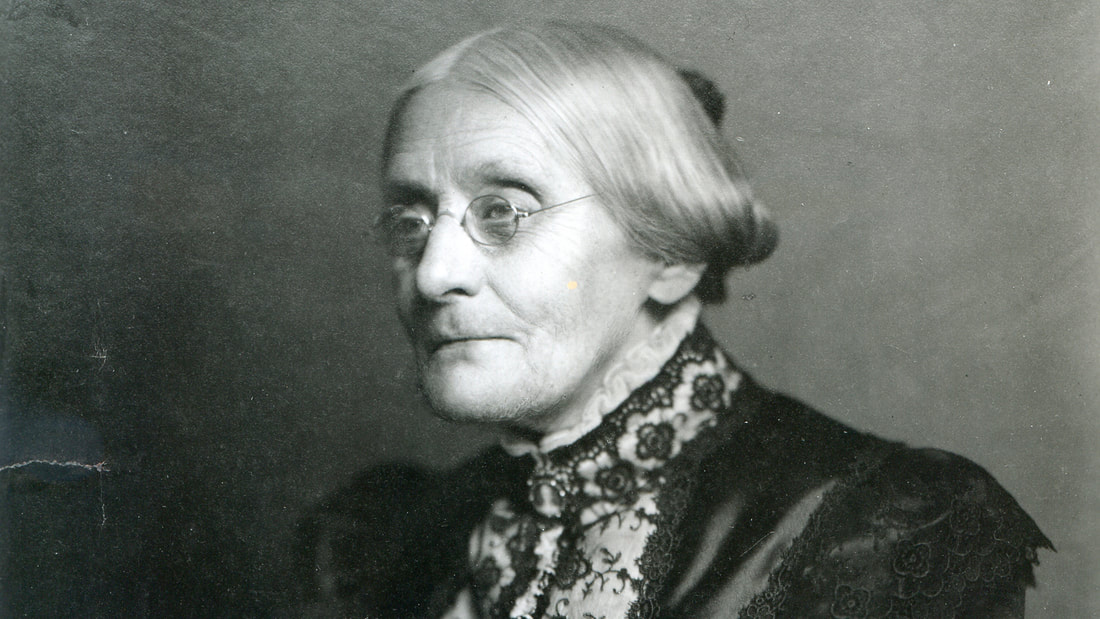Susan was born into an activist family and many of her seven siblings got involved in the anti-slavery movement. One of her brothers fought for the famous John Brown in Kansas and took on pro-slavery forces. Her father was a great example of what a parent should be as he prepared all of his children for when they’d leave home even teaching them business principles;’ he didn’t treat the boys any different from the girls as he wanted them all to be self-sufficient.
In 1837, the U.S. faced a financial crisis and it hit Susan’s family hard. She was 17 at the time and in order to help her family out she got a job teaching at a Quaker boarding school (her family were Quakers). Her dad was very involved in the church and at one point had Sunday school at his house and it was there where Anthony met the famous and charismatic civil rights activist, Frederick Douglas.
Exposure to him got her very involved in the anti-slavery movement. I find it astonishing that a 17-year-old girl back in those days, proactively pursued changing social behavior in the U.S. Could you imagine how many times she was turned away or berated by other people who didn’t believe in her causes especially since she was in the minority? Could you imagine asking for equal pay for equal work with the mentality that existed then?
For about ten years Anthony taught at different institutions and she also took care of running the family farm for two years while her dad was getting an insurance business up and running. She and her father were close, and she was always amused at how supportive he was of anything she pursued; it didn’t hurt that he very much believed in her two major causes.
When she was 31, she pursued social reform on a full-time basis creating various organizations to help the causes. She met Elizabeth Stanton who’d also become a famous person in social reform, and they were a great team. Elizabeth was a great writer and publisher while Susan was an outstanding organizer and speaker. They became close friends to where Susan was pretty much part of Elizabeth’s family. Elizabeth was married and had seven children so she couldn’t travel around the country like Susan did.
As you can imagine, Susan was run out of town many times especially as she gained a reputation. A lot of men weren’t interested in their wives grasping their human rights. The flyers she’d put up were often torn down by angry men and she was heckled on many occasions so she couldn’t speak. The police often had to protect her from angry mobs and get her safely out of town.
The legal issue of “Temperance” was a hot issue among women because it basically gave the husband control over everything including all assets. Many men did not want this law changed so she had to worry about being killed practically anywhere she went especially since men weren’t lining up to provide her with back-up. Keep in mind that during this time, it wasn’t considered proper for women to speak in pubic about any issues.
Due to her efforts the Married Women's Property Act was passed in 1860 and it gave married women the right to own separate property, enter into contracts, and be joint guardian of their children. Extraordinary legislation but with all laws, the enforcement of it was another story. By the way, Susan was also trying to get alcohol outlawed in New York State, so she really wasn’t making many friends.
Not giving up on her current duties with the women’s movement, Susan also jumped into anti-slavery issues including pushing the Emancipation Proclamation, she got directly involved with many Republican legislators in an effort to see what was needed to make it come to fruition. There was talk about shipping slaves back to Africa and she worked against this movement. Susan and her team collected over 400,000 signatures that helped pass the 13th Amendment which ended slavery. Think about how difficult it had to have been back then to collect that many signatures.
The National Labor Union began in 1866 and they tried to get Susan and her movement to merge with them, but she refused. She didn’t want to get spread too thin on issues plus she had a lot of leverage where she was so merging with people she didn’t know didn’t sound like a good idea.
She continued for decades fighting for women’s rights and became a well-known national figure. Although hard to believe this was happening, Susan also fought to get rid of a practice called: feme covert which made it to where women couldn’t sign contracts at work, a man had to sign for them. She was instrumental in getting women the right to vote in Wyoming in 1869 and Utah in 1870.
To add to her rebel image, Susan and 14 other women voted in the 1872 Presidential Election when it wasn’t legal to do so, and they were arrested. The authorities let the other women go but kept Susan. It was a terrible thing for a woman to get caught up into the judicial system back then because she couldn’t be tried by a jury of her peers because women weren’t allowed to be on a jury plus, she wasn’t allowed to speak at the trial until the judge gave his verdict. With these things in mind, the Judge pronounced her guilty and told her to pay a $100 fine which she refused to do. The trial was a political fiasco so the judge told the police to release her even though she wouldn’t pay the fine.
She kept going strong and had an 80th birthday celebration at the White House with President William McKinley and his family. She still hadn’t married and was at this point living with her sister in Rochester, New York. She was asked several times over the years why she hadn’t gotten married, and she had a couple of answers I loved: 1) "It always happened that the men I wanted were those I couldn’t get, and those who wanted me I wouldn't have." 2) "I never found the man who was necessary to my happiness. I was very well as I was."
Even in her older years she kept travelling around the country giving speeches; at one point she was giving over 100 a year. She celebrated her 86th birthday in Washington, D.C. where she gave a speech and three days later her heart stopped, ending a phenomenal journey. She’s received numerous posthumous honors including having a three-cent stamp with her image on it at the U.S. Postal Service and she was the first woman on U.S. currency, the $1 coin. Someone once said the length of your life is less important than its depth; Susan B. Anthony left a crater.


 RSS Feed
RSS Feed